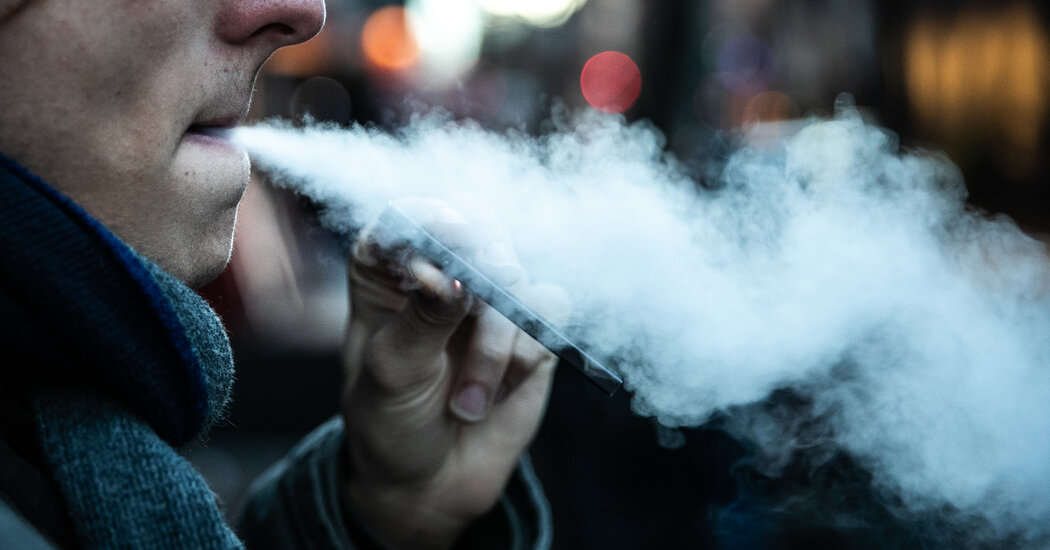After about 25 years of smoking cigarettes, Tim Marchman wanted to quit. And yet he didn’t want to become what he calls “a vape man,” the kind of person who spends hours in specialty stores choosing from dozens of electronic nicotine delivery devices, many of them quite elaborate. So he opted for what seemed to him the simplest option, Juul, a brand that for a while was practically synonymous with vaping.
“Juul is the standard,” Mr. Marchman, an editor at Vice Media’s technology and science site Motherboard, said in an interview. “It’s just plug and play.”
Unlike some other e-cigarette brands, Juul was also widely available. “In gas stations in the middle of nowhere they have it,” Mr Marchman said.
That will probably change.
On Thursday, the Food and Drug Administration ordered Juul Labs to stop selling its devices in the United States, citing insufficient and conflicting data from the company about potentially harmful chemicals that could leak from Juul’s e-liquid pods. On Friday, a federal court granted the company a temporary reprieve, allowing it to keep its e-cigarettes in stores pending a legal review of the FDA’s order.
Like other converts, Mr Marchman says he has no intention of going back to tobacco if it turns out he can’t get his favorite brand of e-cigarette anymore. Still, he wonders how the FDA order could affect his habit.
Read more about smoking and vaping
“If I go out of the country, do I have to take my vape juice with me?” said Mr. Marchman, who is 43 and lives in Philadelphia. “Where do I get it? I hardly know where to get it in Philadelphia.”
The FDA order followed years of criticism of possible adverse health effects from Juul products and how it appealed to teens with a range of sweet flavors, including mango, crème brûlée and mint, as well as marketing campaigns aimed at youth.
Juul Labs’ predecessor company was founded in 2007 by James Monsees and Adam Bowen, a couple of entrepreneurs who came up with the idea of an alternative to tobacco during a smoking break during their time as graduate students at Stanford University. When Juuls was first sold in 2015, the brand exploded in popularity, thanks in part to a vibrant ad campaign in which young people showed smiling, laughing and striking poses under the word ‘Vaporized’.
By 2018, Juul had become so popular that the brand name became a verb, with teens secretly “juuling” in high school classrooms and hallways. That same year, Altria, the parent company of Philip Morris, agreed to pay $13 billion for a 35 percent stake in Juul Labs.
Then came a spate of lawsuits filed by prosecutors accusing the company of encouraging nicotine addiction among teens through its ad campaigns. Juul ended up paying tens of millions of dollars to settle the cases in 2019 and 2021. The company’s rise and fall, from Silicon Valley success story to public health pariah, was chronicled in The New York Times’ 2021 documentary “Move Fast and Vape Things.”
Although Juul lost business after curtailing its advertising in the wake of the lawsuits, it remained one of the most visible and popular e-cigarette brands on the market. For Matthew Luther, 31, who lives in Detroit and repairs leather goods, the news of the potential ban was disturbing.
“I will definitely miss the Juuls,” said the 31-year-old Luther. “I think they were aesthetically better. They are easy to throw in your pocket and they are refillable.”
Like others interviewed for this article, he said he liked the simple design of the Juul device, which resembles a flash drive. “The ban seems retarded to me,” he said.
The FDA ruling came just as Mr. Luther increased his use of Juul products. “I think it’s just life, stress, and I’ve been trying to quit smoking cigarettes,” he said.
Juul’s competitors, including Puff Bar, have grown in recent years. But for many, Juul remains synonymous with vaping devices, such as Kleenex for tissues.
“When I think of e-cigs, I think of Juul,” said Jenny Mathison, who started using the brand in 2018. she added.
Ms. Mathison, 54, who lives in Rancho Mirage, California and is a full-time caregiver to her disabled husband, said she would likely switch to Vuse, a competing brand, if the FDA goes through.
For Philadelphia editor Mr Marchman, the FDA order, if enforced, could lead to him becoming the type he has long feared becoming – a vape guy.
“I’ll end up with some weird vaping setup that I don’t quite understand,” said Mr. Marchman. “I have to pick a device, try different juices. It becomes a whole.”
Sandra E. Garcia reporting contributed.

